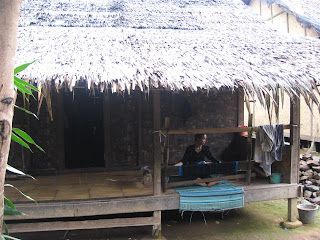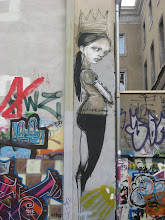Neither the people nor the landscape resemble anything like the prairies I know but still there is an underlying honest industriousness in this scene that reminds me of home. I smile and join the collective chorus of "ooooch"es and "aaaaiiiee"s of the other bus riders, our bodies abused by every crack, rock and bump in the road.
When we finally stop in Palaraja we stock up on food and water before hiring ojecks to take us to the bus station in Raykas Bittung. When we arrive there is a rush of touts, each trying to lure me to their bus, and farmers with baskets full of produce and homemade snacks trying to convince me to eat. A sun beaten lady with only one tooth and a bandana wrapped high around her head wants to sell me a fishy smelling crackers but when I agree only if she will let me take her picture, she refuses and walks away.
The drive up the mountain is a lush array of verdent forest and rice fields. Slowly the litter that normally lines every sidewalk, street and front yard disappears and the villages become tidier though the gutter smells seem almost more of an assault now that we've smelled the stark clean reprieve of earth and rain.
At the end of the road is the village of Aweh with great big statue in the town center to commemorate the Baduy.It isn't fine art but you know you've arrived in the right place.
In front of this statue is a shiny happy restaurant and hotel owned by one Augus Bule. He is not in fact bule and no one really knows how he came by his name, but he will arrange for a guide to take you up the mountain. I am normally not the sort of traveler who hires guides, but here on this mountain a guide is essential for three reasons:
1) There is a post on the other side of the village, before you enter the baduy and they will not let you in without a guide.
2) The mountain does not want you on it and you are quite likely to get lost.
3) The guide is the intermediary between you and the Baduy who carry large machetes and are not afraid to use them.
Within an hour we set off to climb the mountain with our guide Mang (which is the Sudanese equivalent of Mas) Udine but we haven't even made it to the post when the skies open up and the rain begins. We take shelter until the showers ease to a drizzle then begin our ascent up the muddy slopes, past the villagers carrying water balanced on their heads, baskets of vegetables tied to their backs and children playing soccer in the mud.
We climbed for six hours the first day, me with my heart humming and thrumming happily in tune again with the Great Key, feeling at home again after such a long exile in the urban squalor.
Of course, the climbing was easy and fun for me but the descents were a blundering plague on my hike with the sheer drops always at the edge of my periphery taunting and mocking my fear of heights. My steps became plodding and careful, painfully slow, while Baduy villagers nimbly sidestepped me in their bare feet, teetering on the edges seemingly unaware of the dangers and equally baffled by my lumbering pace. Still, Mang Udine assured us we were making good time and it was still well before dusk when the village we would spend our first night in came into view.
We had barely sat down on their front porch when our hosts proffered a plate of brown sugar assuring us it would make us strong for the mountain. I took a small chunk and placed it on my tongue expecting a saccharine bite but discovering instead a subtle mellow sweet with a hint of cocoa. The softest, most delicate chocolate cake I've ever tasted.
When the plate was empty Mang Udine lead us a short way up the lane to show us the bridge we would cross tomorrow. It was four bamboo sticks wide and seemed to have been constructed by MacGyver using only bamboo, mud and a shoelace. Mang Udine insisted I cross it, though I tried to demur imagining the rain slick, smooth bamboo more slippery than butter tossing me with ease into the rapids below. When I reached the other side, Adik was amazed saying, "I have never seen you afraid before. I never knew you could be afraid."
"Of course I'm afraid. If I wasn't afraid, I wouldn't be alive."
Mang Udine was smiling broadly at me and I made a face at him turning his smile into a gentle laugh. We wandered a little farther up the path and he pointed across the river to a house with a large black wreath on the roof. This is the chiefs house and he warns us that we must not take pictures of it. We solemnly agreed and then, laughing, he pointed to a sign that read, "No visitors bathing past this point". He tells us the story of a French lady who visited once, and the whole village woke in the morning to discover her bathing, completely, nude in the river.
Mang Udine took us to the bath house to clean up before dark. The bath house is a bamboo hut, without a door but with a bucket and a water hose. Squatting over a hole in the corner used for a toilet, a chicken and three chicks wandered through a large hole in the wall and began pecking at my feet.
When I finished my own bird bath I stood guard for Adik and watched a giant moon rise full and illuminate the night sky, framed by the black outline of the swaying palm trees.
There is no electricity and the path back is illuminated only by the occasional candle on a porch. We changed into clean clothes, we drank tea sweetened with more palm sugar and we crawled into bed.







No comments:
Post a Comment